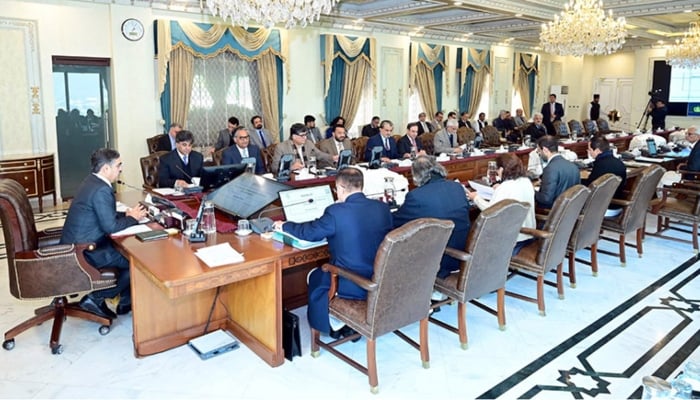ISLAMABAD: A federal cabinet meeting presided by Caretaker Prime Minister Anwarul Haq Kakar will be held on today (Tuesday) to mull over greenlighting the Federal Board of Revenue (FBR)’s revamp and digitisation, contrary to the International Monetary Fund (IMF)’s suggestions to enhance the tax administration, The News reported.
Some startling disclosures showed that the caretaker setup has adopted a poor governance mechanism during its tenure.
The cabinet meeting’s minutes mentioned that the forum had formed an inter-ministerial body that would be convened by the finance minister with ministers of foreign affairs, privatisation, law and justice, energy, commerce, IT and telecommunications. The meeting also considered the summary submitted by the revenue division ‘Restructuring of the Federal Board of Revenue and Digitisation’. The committee was tasked with deliberating on the reform proposals and refining them for consideration by the cabinet in its next meeting.
The minutes state that the Federal Board of Revenue (FBR) shall (i) make the tax return form simple enough for the common person to understand and fill out; and (ii) reduce its length to no more than two pages, with provisions for supplementary information where required.
“Given its constitutional and legal mandate, the caretaker government would only carry out the groundwork for the Federal Board of Revenue’s structural reforms, keeping in view the public interest, but legislation to effect these reforms would be left to the newly elected government,” the official minutes of the last cabinet meeting state.
Now the question arises: if there was a futile exercise keeping in view the minutes of the last cabinet meeting, why were all energies wasted?
On the other hand, the IMF’s Technical Assistance Report on Revenue Administration Diagnostic stated that the proposals to develop the FBR into a semi-autonomous revenue authority are fully supported and encouraged.
“The IMF has recommended a fixed tenure for the chairman of the tax authority,” the report added.
The IMF has shared options to transform the FBR into a single national tax authority to administer all federal and progressively provincial taxes or restructure the FBR as a federal tax agency with coordinated linkages across all provincial tax agencies.
The IMF report, prepared by Robert Woods, an expert in the Fiscal Affairs Department of the Fund, proposed a future for the revenue authority and stated that the task force established by the government has developed different proposals to restructure the revenue administration.
The proposal options under consideration were to transform the FBR into a single national tax authority to administer all federal and progressively provincial taxes or to restructure the FBR as a federal tax agency with coordinated linkages across all provincial tax agencies.
The establishment of the tax authority as a performance-driven semi-autonomous revenue authority with its own service rules, recruitment, and management policies ultimately operating under a single-line budget.
There is a need to ensure strong governance and performance management by appointing an independent tax oversight and administration board. It recommended a fixed tenure for the head of the tax authority.
The restructuring of Customs is to focus on trade facilitation, border control, and anti-smuggling operations, either by separating the Customs from the FBR to form a customs and border control authority under the finance ministry under the oversight of its board or by establishing a single reporting head for Customs within the tax authority. The proposal to adopt digital revenue administration through electronic invoicing and a digital withholding system is also under consideration. The proposal for strengthening information technology support for digital administration is also being considered.
The caretaker finance minister has left no stone unturned to bulldose the FBR restructuring plan of her own choice and pressured it to write in the summary that the inter-ministerial extended the support of the revamp plan.
However, the FBR members insisted that they would write in the summary that there was stiff opposition to this restructuring plan incorporated in the summary to give a chance to the federal cabinet to make an informed decision. But there was pressure to show through the summary that everything was okay.
The FBR made it clear that they would only send the summary once they received the minutes of the last cabinet meeting. How could they comply with the verbal orders without having read the last minutes of the meeting?
On Monday evening, the FBR received the official minutes of the last Federal Cabinet meeting, in which an inter-ministerial committee was constituted to further deliberate on the summary for the FBR restructuring.
Earlier, the secretary of revenue/chairman of the FBR had refused to prepare and forward another summary without getting the official minutes of the last cabinet meeting.
Deliberate efforts were going on to convince the law minister to withdraw his comments on the inability of the caretaker government to make massive legislation under which the government had to bring 1010 changes to the existing tax laws.
This Inter-Ministerial Committee proved another fiasco because none of the caretaker ministers except Ejaz Gohar had supported the FBR revamp idea. However, Gohar had also raised the question of massive under-invoicing in the official meeting. There were the fewest reform proposals given by the minister of foreign affairs, but he had also proposed three to four recommendations to implement them to improve tax efficiency.
The energy minister had proposed to abolish the FBR and establish a new tax entity. The minister for law had opposed such massive legal changes and argued that it was not the power of the caretakers to make such legislation.
The committee’s mission was to discuss and improve the reform ideas so that the cabinet might take them up at its upcoming meeting.
According to the minutes, the Federal Board of Revenue (FBR) is expected to: (i) simplify the tax return form such that it is easily understood and completed by the average person; and (ii) limit its length to no more than two pages, with space reserved for additional information as needed.
According to the official minutes of the most recent cabinet meeting, “Given its constitutional and legal mandate, the caretaker government would only carry out the groundwork for the Federal Board of Revenue’s structural reforms, keeping in mind the public interest, but legislation to effect these reforms would be left to the newly elected government.”
Now, the issue is raised: why were all the efforts used if there was a pointless exercise considering the minutes of the most recent cabinet meeting?
In contrast, the IMF’s Technical Assistance Report on Revenue Administration Diagnostic said that it fully supports and encourages the recommendations to transform the FBR into a semi-autonomous revenue authority.
The report also stated, “The IMF has recommended a fixed tenure for the chairman of the tax authority.”
The FBR may be reorganized as a federal tax agency with integrated links to all provincial tax agencies, or it might become a single national tax body overseeing all federal and gradually provincial taxes, according to alternatives offered by the IMF.
The IMF study, written by Robert Woods, a specialist in the Fund’s Fiscal Affairs Department, outlined a plan for the revenue authority’s future and mentioned that the government-appointed task force had produced various suggestions for restructuring the tax administration.
The FBR might be reorganized as a federal tax agency with integrated links to all provincial tax agencies, or it could be transformed into a single national tax authority to oversee all federal and gradually provincial taxes.
the creation of the tax authority as a revenue authority with a single-line budget that operates on a performance-driven, semi-autonomous basis and has its own hiring, management, and service regulations.
By establishing an independent board for tax oversight and administration, it is necessary to guarantee sound governance and performance management. It suggested giving the head of the tax authority a set term of office.
Either by separating Customs from the FBR to form a customs and border control authority under the finance ministry under its board’s supervision, or by creating a single reporting head for Customs within the tax authority, the restructuring of Customs will concentrate on trade facilitation, border control, and anti-smuggling operations. Additionally being considered is the idea to implement digital withholding and electronic invoicing as a means of digital revenue administration. Additionally under consideration is the suggestion to improve the information technology support for digital administration.
The FBR restructuring plan of her choosing has been relentlessly pursued by the acting finance minister, who has exerted pressure on it to state in the summary that the interministerial has extended support for the revamp plan.
To provide the federal cabinet an opportunity to make an informed choice, the FBR members insisted that they include in the summary that there is strong opposition to the reorganization plan. However, pressure existed to convey through the summary that everything was OK.
The FBR stated unequivocally that they would not send the summary until they had the most recent cabinet meeting’s minutes.
Without having perused the most recent meeting minutes, how were they supposed to follow the verbal directives?
The formal minutes of the most recent Federal Cabinet meeting, in which an interministerial group was established to further discuss the proposal for the FBR reform, were delivered to the FBR on Monday night.
Previously, the FBR chairman and secretary of revenue had declined to draft and provide a new summary until they received the official minutes of the most recent cabinet meeting.
There were concerted efforts underway to persuade the law minister to retract his remarks regarding the caretaker government’s incapacity to enact significant legislation, which required the government to amend the current tax code by 1010.
With the exception of Ejaz Gohar, all caretaker ministers had opposed the idea of an FBR redesign, hence this Inter-Ministerial Committee proved to be another disaster. But Gohar had also brought up the issue of significant under-invoicing during the formal meeting. The minister of international affairs made the fewest reform recommendations, although he did make three or four recommendations on how to put them into practice to increase tax efficiency.
The minister of energy has suggested creating a new tax body and doing away with the FBR. The minister of law had objected to these significant legal modifications, claiming that the caretakers lacked the authority to enact such laws.







